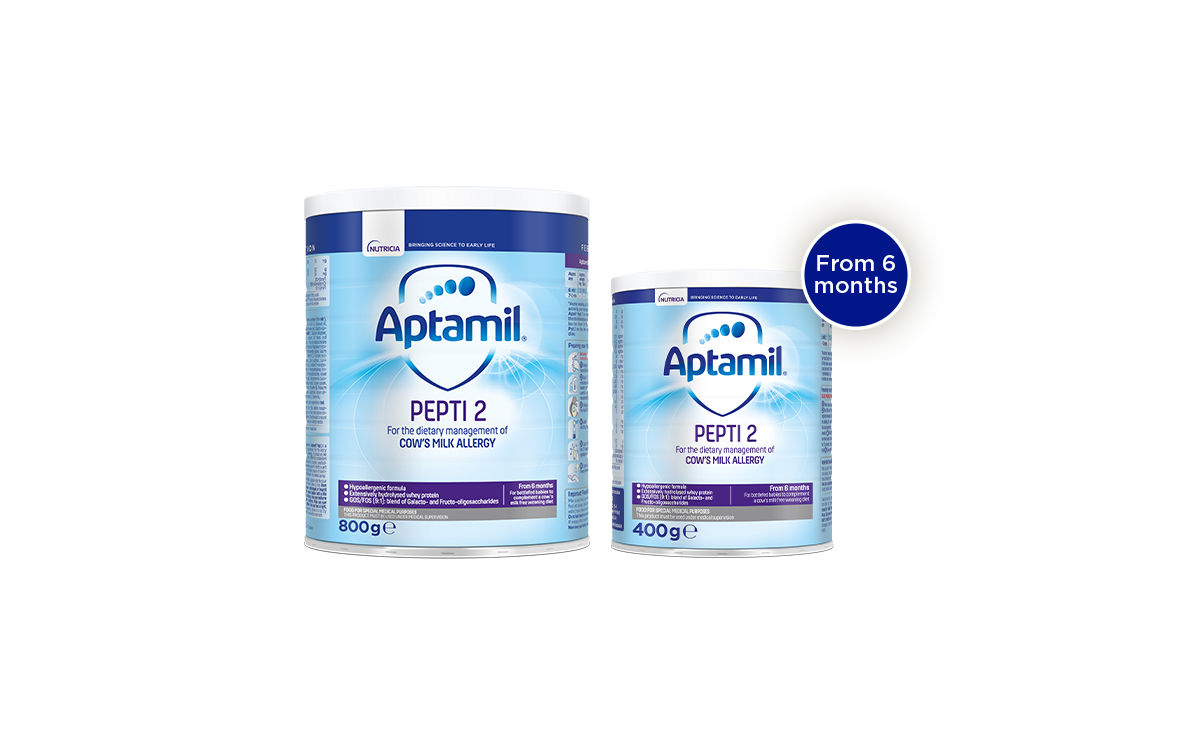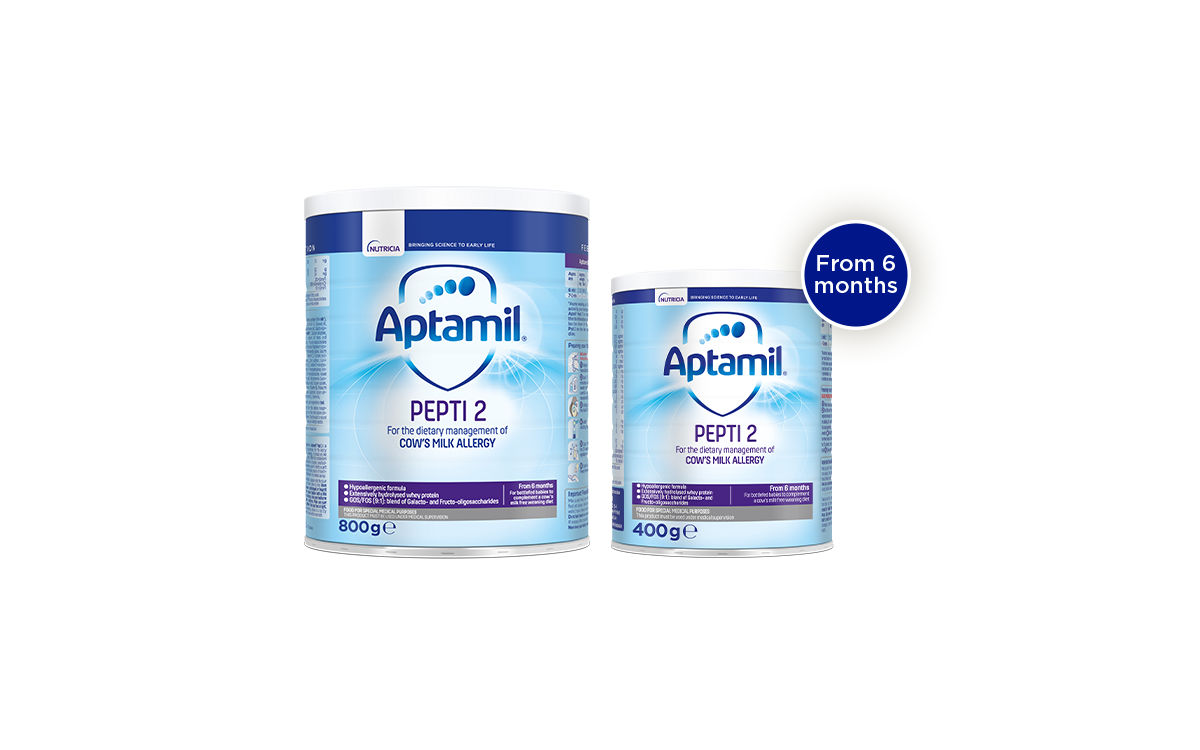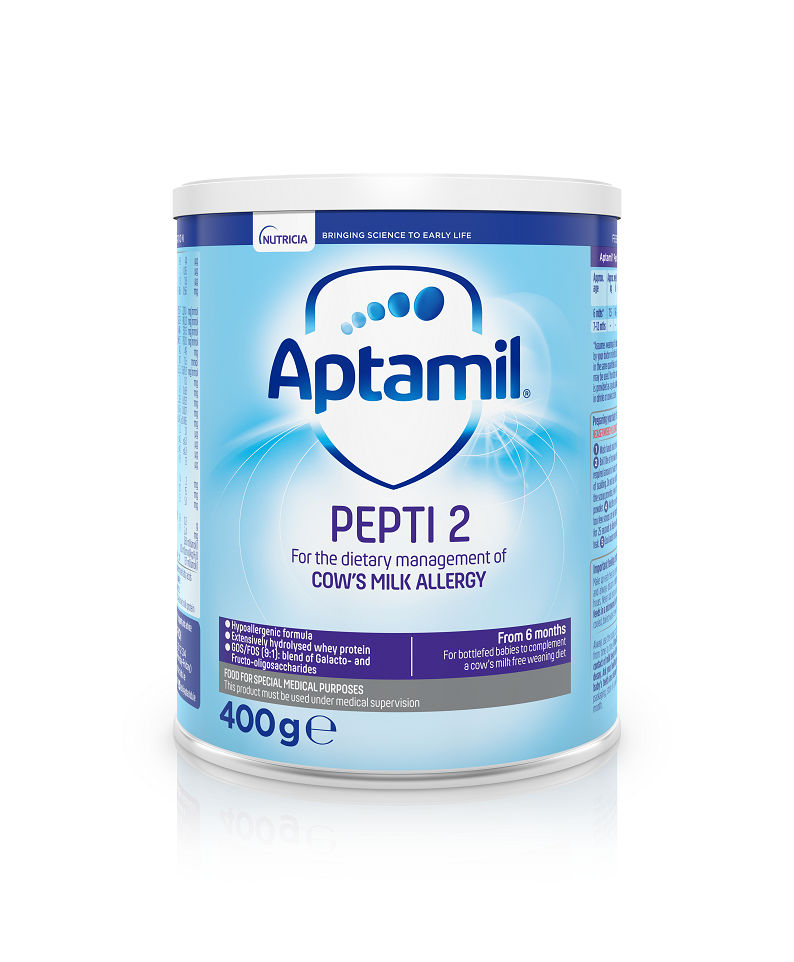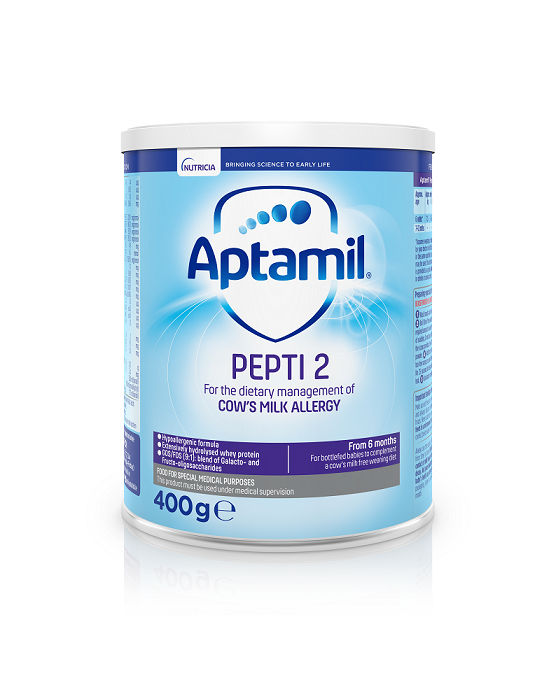Aptamil Pepti 2 (from 6 months)
Aptamil Pepti 2 is a whey-based extensively hydrolysed formula for the dietary management of Cow’s Milk Allergy from 6 months to complement a cow’s milk free weaning diet and can also be used to replace cow’s milk in drinks and cooked dishes and after weaning.

- The only extensively hydrolysed formula for infants to contain galacto- and fructo-oligosaccharides (GOS/FOS), which encourage the growth of friendly bacteria in the gut1-2 and have also been shown to reduce allergic manifestations over 5 years3.
- The Aptamil Pepti range is the UK's most palatable EHF range4-5. Aptamil Pepti is whey-based and contains lactose for superior palatability, compared with a casein-based hydrolysate6.
- Aptamil Pepti 2 is formulated with extra calcium, vitamin D and iron to meet the requirements of infants with cow's milk allergy.
Q. How does Aptamil Pepti 2 help manage the symptoms of CMA?
A. An extensively hydrolysed formula (EHF) is usually recommended for mild or moderate cases of CMA. This is because the proteins have been broken down to make them easier to tolerate and digest. Aptamil Pepti 2 is an extensively hydrolysed whey-based formula containing 80–85% short chain peptides and 15–20% free amino acids.
Q. Why is Aptamil Pepti made with whey?
A. Aptamil Pepti is 100% whey-based to give it a more palatable taste.
Q. What age is Aptamil Pepti 2 suitable for?
A. Aptamil Pepti 2 is suitable from 6 months of age to complement a cow's milk free weaning diet.
Q. How long should a baby stay on Aptamil Pepti 2?
A. All babies are different. If an infant is still experiencing symptoms by 6 months of age, Aptamil Pepti 2 can be used. Most babies grow out of their allergy between 1 and 3 years old, particularly if they have delayed symptoms after ingesting cows’ milk. Others may take a bit longer.
Q. Is Aptamil Pepti 2 suitable for babies with other dietary requirements?
A. This product is not suitable for vegetarians as it contains LCPs sourced from fish.
Q. Is there anything unusual about the preparation of the formula?
A. Due to the specialist formulation, there may be some separation of prepared feeds on standing. It should be shaken well before use.
Q. How does Aptamil Pepti 2 differ from Aptamil Pepti 1?
A. Clinically, the products are the same. They have the same hydrolysate and all the evidence to support the clinical efficacy of Pepti 1 is applicable to Pepti 2. However, nutritionally, Pepti 2 has been specially formulated to provide the increased levels of key micronutrients, such as calcium and iron, required from 6 months. Increased levels of calcium are particularly relevant to infants who are on a dairy-free diet due to CMA, as the majority of an infant’s calcium intake usually comes from dairy. In addition, iron stores start to deplete between 4 and 6 months in infants, so a dietary source of iron is important.
- Moro G et al. Dosage-related bifidogenic effects of galacto- and fructooligosaccharides in formula-fed term infants. J Pediatr Gastroenterol Nutr 2002;34(3):291-5.
- Gibson GR et al. Dietary modulation of the human colonic microbiota: introducing the concept of prebiotics. J Nutr 1995;125(6):1401-12.
- Arslanoglu S., Moro G.E., Boehm G. Wienz F., Stahl B., Bertino E. Early Neutral Prebiotic Oligosaccharide Supplementation Reduces the Incidence of Some Allergic Manifestations in the First 5 Years of Life. J. Biol. Regul. Homeost. Agents. 2012;26(Suppl.3):49-59.
- Maslin K et al. Palatability of hypoallergenic formulas for Cow’s Milk Allergy and healthcare professional recommendation. Pediatr. Allergy Immunol. 2018; 29(8): 857-862. *A home usage test assessment was carried out between 16/11/16 and 9/12/16 on the 4 products indicated for Cows’ Milk Allergy from birth and included 100 UK healthcare professionals.
- Data on file, updated independent taste panel report, Campden BRI, October 2020. n=102 HCPs, Campden BRI blind home usage taste testing, n=102 Dietitians and General Practitioners, n=82 parents. Aptamil Pepti 1 & Pepti Syneo vs all UK EHFs suitable for infants from birth.
- Venter C. Cow’s milk protein allergy and other food hypersensitivities in infants. J Family Healthcare. 2009;19 (4):130-131
- Moro G et al. Dosage-related bifidogenic effects of galacto- and fructooligosaccharides in formula-fed term infants. J Pediatr Gastroenterol Nutr 2002;34(3):291-5.
- Gibson GR et al. Dietary modulation of the human colonic microbiota: introducing the concept of prebiotics. J Nutr 1995;125(6):1401-12.
- Arslanoglu S., Moro G.E., Boehm G. Wienz F., Stahl B., Bertino E. Early Neutral Prebiotic Oligosaccharide Supplementation Reduces the Incidence of Some Allergic Manifestations in the First 5 Years of Life. J. Biol. Regul. Homeost. Agents. 2012;26(Suppl.3):49-59.
- Maslin K et al. Palatability of hypoallergenic formulas for Cow’s Milk Allergy and healthcare professional recommendation. Pediatr. Allergy Immunol. 2018; 29(8): 857-862. *A home usage test assessment was carried out between 16/11/16 and 9/12/16 on the 4 products indicated for Cows’ Milk Allergy from birth and included 100 UK healthcare professionals.
- Data on file, updated independent taste panel report, Campden BRI, October 2020. n=102 HCPs, Campden BRI blind home usage taste testing, n=102 Dietitians and General Practitioners, n=82 parents. Aptamil Pepti 1 & Pepti Syneo vs all UK EHFs suitable for infants from birth.
- Venter C. Cow’s milk protein allergy and other food hypersensitivities in infants. J Family Healthcare. 2009;19 (4):130-131
- Moro G et al. Dosage-related bifidogenic effects of galacto- and fructooligosaccharides in formula-fed term infants. J Pediatr Gastroenterol Nutr 2002;34(3):291-5.
- Gibson GR et al. Dietary modulation of the human colonic microbiota: introducing the concept of prebiotics. J Nutr 1995;125(6):1401-12.
- Arslanoglu S., Moro G.E., Boehm G. Wienz F., Stahl B., Bertino E. Early Neutral Prebiotic Oligosaccharide Supplementation Reduces the Incidence of Some Allergic Manifestations in the First 5 Years of Life. J. Biol. Regul. Homeost. Agents. 2012;26(Suppl.3):49-59.
- Maslin K et al. Palatability of hypoallergenic formulas for Cow’s Milk Allergy and healthcare professional recommendation. Pediatr. Allergy Immunol. 2018; 29(8): 857-862. *A home usage test assessment was carried out between 16/11/16 and 9/12/16 on the 4 products indicated for Cows’ Milk Allergy from birth and included 100 UK healthcare professionals.
- Data on file, updated independent taste panel report, Campden BRI, October 2020. n=102 HCPs, Campden BRI blind home usage taste testing, n=102 Dietitians and General Practitioners, n=82 parents. Aptamil Pepti 1 & Pepti Syneo vs all UK EHFs suitable for infants from birth.
- Venter C. Cow’s milk protein allergy and other food hypersensitivities in infants. J Family Healthcare. 2009;19 (4):130-131
Aptamil Pepti 2 is a whey-based extensively hydrolysed formula for the dietary management of mild to moderate Cow’s Milk Allergy from 6 months. Aptamil Pepti 2 can be used to complement a cow’s milk free weaning diet and can also be used to replace cow’s milk in drinks and cooked dishes and after weaning.

Aptamil Pepti 2 is the only extensively hydrolysed infant formula that contains a blend of prebiotic galacto- and fructo-oligosaccharides (GOS/FOS), which encourage the growth of friendly bacteria in the gut and regulate the expression of inflammatory mediators1,2. They have also been shown to reduce allergic manifestations over 5 years3.
Superior palatability: contains extensively hydrolysed whey protein, proven to be more palatable when compared to casein based EHFs. Aptamil Pepti 2 also contains lactose which positively impacts the infant gut microbiome and additionally improves the palatability of EHFs4,5.
Addition of key nutrients: formulated with extra calcium, vitamin D and iron as infants and children on elimination diets for Cows’ Milk Allergy may have significantly reduced intakes of some micronutrients6-7.
FAQs
Q. How does Aptamil Pepti 2 help manage the symptoms of CMA?
A. An extensively hydrolysed formula (EHF) is usually recommended for mild or moderate cases of CMA8. This is because the proteins have been broken down to make them easier to tolerate and digest. Aptamil Pepti 2 is an extensively hydrolysed whey-based formula containing 80–85% short chain peptides and 15–20% free amino acids.
Q. Why is Aptamil Pepti made with whey?
A. Aptamil Pepti is 100% whey-based to give it a more palatable taste.
Q. What age is Aptamil Pepti 2 suitable for?
A. Aptamil Pepti 2 is suitable from 6 months of age to complement a cows’ milk free weaning diet.
Q. How long should a baby stay on Aptamil Pepti 2?
A. All babies are different. If an infant is still experiencing symptoms by 6 months of age, Aptamil Pepti 2 can be used. Most babies grow out of their allergy between 1 and 3 years old, particularly if they have delayed symptoms after ingesting cows’ milk. Others may take a bit longer.
Q. Is Aptamil Pepti 2 suitable for babies with other dietary requirements?
A. This product is not suitable for vegetarians as it contains LCPs sourced from fish.
Q. Is there anything unusual about the preparation of the formula?
A. Due to the specialist formulation, there may be some separation of prepared feeds on standing. It should be shaken well before use.
Q. How does Aptamil Pepti 2 differ from Aptamil Pepti 1?
A. Clinically, the products are the same. They have the same hydrolysate and all the evidence to support the clinical efficacy of Pepti 1 is applicable to Pepti 2. However, nutritionally, Pepti 2 has been specially formulated to provide the increased levels of key micronutrients, such as calcium and iron, required from 6 months. Increased levels of calcium are particularly relevant to infants who are on a dairy-free diet due to CMA, as the majority of an infant’s calcium intake usually comes from dairy. In addition, iron stores start to deplete between 4 and 6 months in infants, so a dietary source of iron is important.
Q. What if an infant doesn’t seem to like the taste of Aptamil Pepti?
A. Aptamil Pepti Syneo does taste different to other Aptamil formulas due to the broken down proteins but this is normal. This is why is it important to allow at least 14 days for the infant to transition to the new formula.
Q. When can I expect to see an impact of switching an infant to Aptamil Pepti?
A. Every infant is different. Some symptoms may resolve very quickly, others may take longer. As a guideline you can expect most symptoms to improve within 2 weeks. If symptoms seem to get worse, do not show signs of improvement or you have any concerns, an infant may require further input from a doctor or dietitian for potentially moderate to severe CMA.
- Moro G et al. J Pediatr Gastroenterol Nutr 2002;34(3):291-5.
- Gibson GR, Roberfroid MB. J Nutr 1995;125(6):1401-1.
- Arslanoglu S., Moro G.E., Boehm G. Wienz F., Stahl B., Bertino E. Early Neutral Prebiotic Oligosaccharide Supplementation Reduces the Incidence of Some Allergic Manifestations in the First 5 Years of Life. J. Biol. Regul. Homeost. Agents. 2012;26(Suppl.3):49-59.
- Venter C. Cow’s milk protein allergy and other food hypersensitivities in infants [Online]. Available at: https://www.jfhc.co.uk/cows-milk-protein-allergy-and-other-food-hypersensitivities-in-infants
- Maslin K et al. Palatability of hypoallergenic formulas for Cow’s Milk Allergy and healthcare professional recommendation. Pediatr. Allergy Immunol. 2018; 29(8): 857-862. *A home usage test assessment was carried out between 16/11/16 and 9/12/16 on the 4 products indicated for Cows’ Milk Allergy from birth and included 100 UK healthcare professionals.
- David TJ et al. Arch Dis Child 1984;59:323-5.
- Tiainen JM et al. Eur J Clin Nutr 1995;49(8):605-12.
- Fox A et al. Clin Transl Allergy 2019;9:40.



